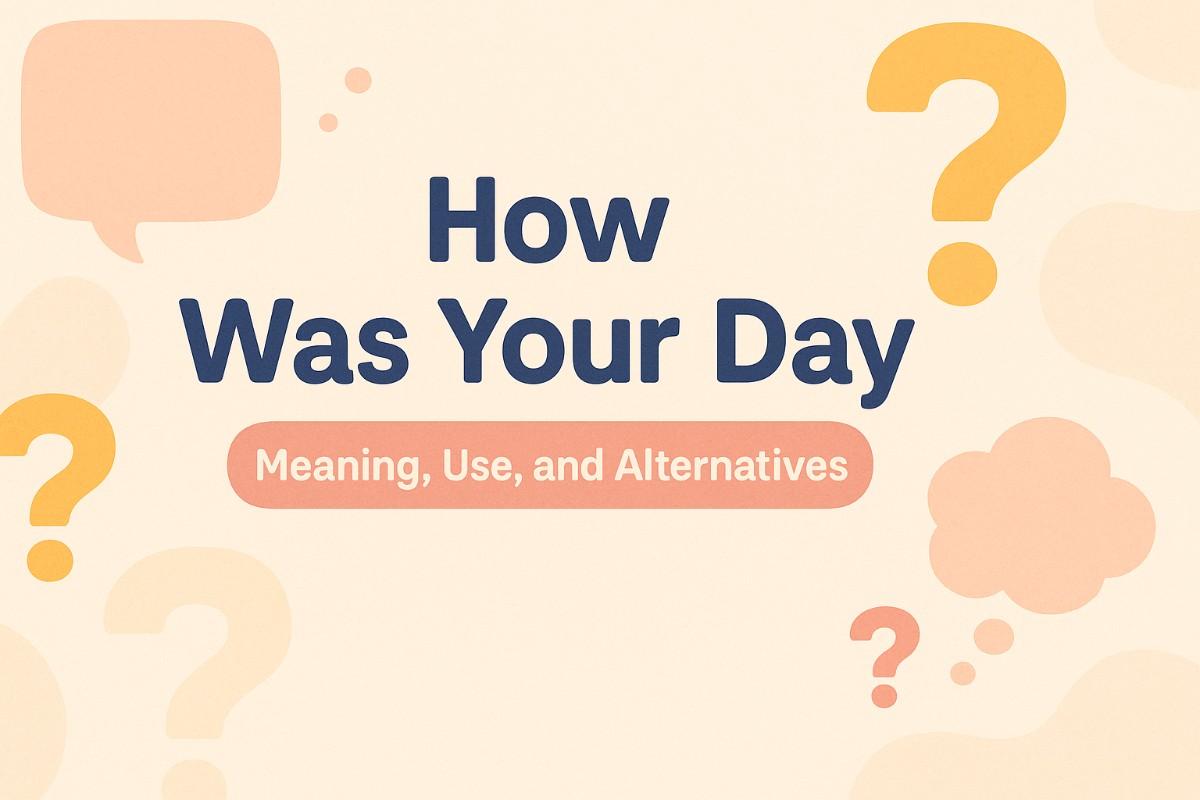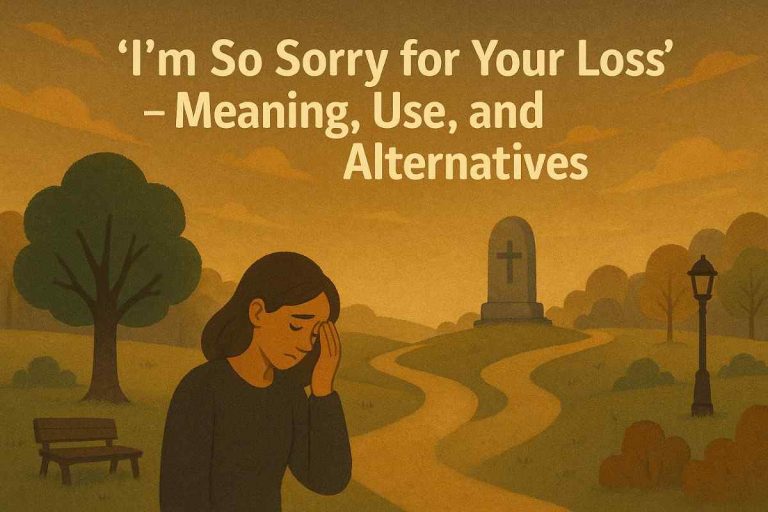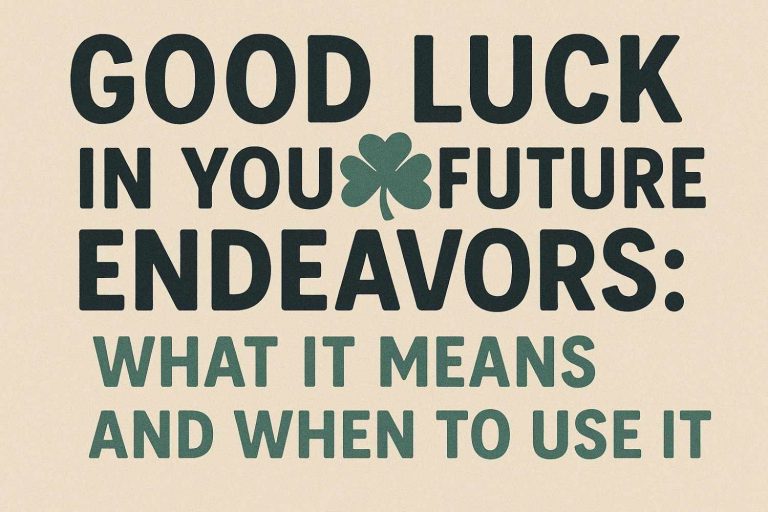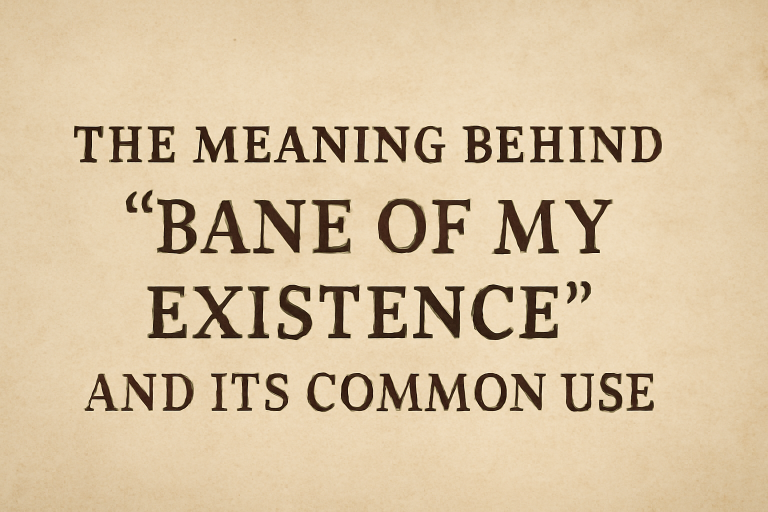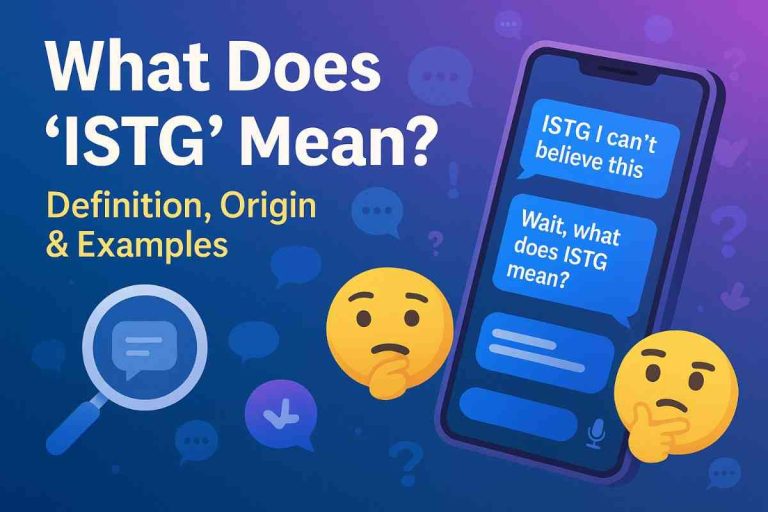“How Was Your Day” – Meaning, Use, and Alternatives
Small talk can open doors to deeper conversations. One of the most common ways people check in is by asking: “How was your day?”
It’s a friendly question that shows you care. But when you ask it often, it can feel routine. People may give short answers without much thought. If you want better, more engaging replies, you can try different ways to ask.
This guide explains what “How was your day” means, when to use it, 20+ alternatives, and how to respond when someone asks you.
What Does “How Was Your Day” Mean?
The question is simple. You’re asking someone to share details about their day—good, bad, or in-between.
It can be a greeting, a way to start a conversation, or a sign of care. It tells the other person you’re interested in their life.
Depending on tone, it can be casual, romantic, friendly, or professional.
When and Where to Use “How Was Your Day”
You can use this question in many settings:
- At home – Checking in with family after work or school.
- With friends – Starting a casual chat or text.
- At work – Breaking the ice before meetings.
- On dates – Showing interest in the other person’s life.
- With clients – Building rapport before business talk.
It’s best when you truly want to hear the answer. If you use it just out of habit, it can feel empty.
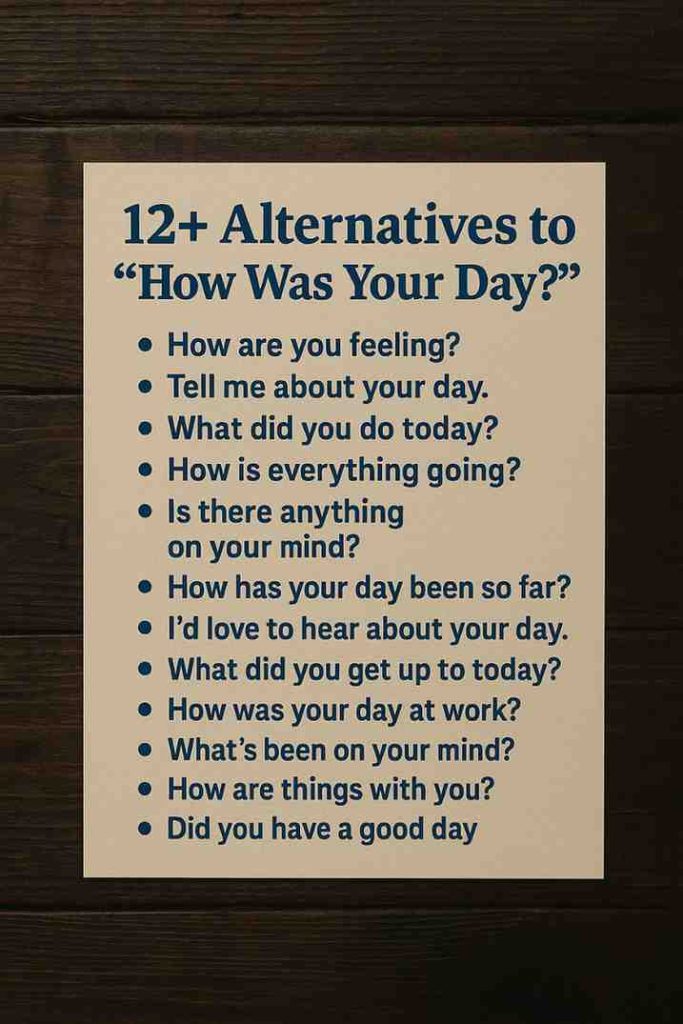
Discover the Story – “Nice Seeing You Again” – Meaning, Use, and Alternatives
20+ Alternatives to “How Was Your Day”
1. “What was the best part of your day?”
Meaning: Asking about the highlight.
Explanation: Encourages a positive, detailed reply.
Scenario Example: “What was the best part of your day at the conference?”
Tone: Upbeat and curious.
2. “Anything exciting happen today?”
Meaning: Asking for notable events.
Explanation: Works well in casual chats.
Scenario Example: “Anything exciting happen today at work?”
Tone: Friendly and playful.
3. “What did you get up to today?”
Meaning: Asking how someone spent their time.
Explanation: Common in British English, casual in tone.
Scenario Example: “What did you get up to today after class?”
Tone: Relaxed and conversational.
4. “How’s your evening going?”
Meaning: Checking in during the evening.
Explanation: Time-specific version for later in the day.
Scenario Example: “How’s your evening going so far?”
Tone: Warm and casual.
5. “How are things going for you today?”
Meaning: Asking about the general flow of their day.
Explanation: More open than “How was your day?”
Scenario Example: “How are things going for you today at the office?”
Tone: Friendly and caring.
6. “How’s your morning been?”
Meaning: Asking about the start of the day.
Explanation: Perfect for early conversations.
Scenario Example: “How’s your morning been so far?”
Tone: Light and polite.
7. “Did anything fun happen today?”
Meaning: Asking for enjoyable moments.
Explanation: Works well with friends and partners.
Scenario Example: “Did anything fun happen today at practice?”
Tone: Playful and friendly.
8. “What’s been the highlight of your day?”
Meaning: Asking for the most memorable part.
Explanation: Encourages storytelling.
Scenario Example: “What’s been the highlight of your day so far?”
Tone: Warm and engaging.
9. “How’s your week going so far?”
Meaning: Expands the question to the whole week.
Explanation: Useful if you see someone every few days.
Scenario Example: “How’s your week going so far at work?”
Tone: Friendly and broad.
10. “How’s life treating you today?”
Meaning: Asking how someone feels about their day.
Explanation: Adds a personal touch.
Scenario Example: “How’s life treating you today, Sam?”
Tone: Caring and personal.
11. “How have you been today?”
Meaning: Checking on well-being for the day.
Explanation: Slightly more formal than “How was your day?”
Scenario Example: “How have you been today since the meeting?”
Tone: Polite and warm.
12. “Did you have a good day?”
Meaning: Simple yes-or-no question about the day.
Explanation: Best for quick check-ins.
Scenario Example: “Did you have a good day at the festival?”
Tone: Friendly and light.
13. “How did your day turn out?”
Meaning: Asking about the day’s outcome.
Explanation: Good when you know the day had plans or events.
Scenario Example: “How did your day turn out after that interview?”
Tone: Curious and supportive.
14. “What’s new with you today?”
Meaning: Asking for updates.
Explanation: Good for catching up with friends.
Scenario Example: “What’s new with you today since we last spoke?”
Tone: Casual and warm.
15. “Tell me about your day.”
Meaning: Inviting them to share freely.
Explanation: Works in close relationships.
Scenario Example: “Tell me about your day when you get a chance.”
Tone: Open and caring.
16. “How’s your afternoon been?”
Meaning: Checking in during the middle of the day.
Explanation: Great for midday calls or messages.
Scenario Example: “How’s your afternoon been at the workshop?”
Tone: Polite and friendly.
17. “Was today busy for you?”
Meaning: Asking about workload or schedule.
Explanation: Good for work or school conversations.
Scenario Example: “Was today busy for you at the store?”
Tone: Concerned and friendly.
18. “How did everything go today?”
Meaning: Asking about planned events or tasks.
Explanation: Useful after big meetings or projects.
Scenario Example: “How did everything go today with the client pitch?”
Tone: Supportive and interested.
19. “How’s your day been so far?”
Meaning: Checking in mid-day.
Explanation: Works at any point before the day ends.
Scenario Example: “How’s your day been so far at the conference?”
Tone: Friendly and flexible.
20. “What was the most interesting thing today?”
Meaning: Asking for a standout event.
Explanation: Encourages specific details.
Scenario Example: “What was the most interesting thing today in class?”
Tone: Curious and engaging.
21. “How did you spend your day?”
Meaning: Asking for an overview of activities.
Explanation: Great for catching up after time apart.
Scenario Example: “How did you spend your day off?”
Tone: Neutral and open.
22. “What stood out to you today?”
Meaning: Asking for memorable moments.
Explanation: Works in both casual and reflective conversations.
Scenario Example: “What stood out to you today during the trip?”
Tone: Thoughtful and friendly.
How to Respond When Someone Says “How Was Your Day”
Your response can be short or detailed, depending on time and relationship. Common short replies:
- “Good, thanks for asking.”
- “Busy but good.”
- “It’s been great so far.”
- “Pretty relaxing, actually.”
For longer answers, you can share details:
“It’s been good. I finished my report early and met a friend for lunch.”
If the day wasn’t great, it’s fine to be honest:
“A bit stressful, but I’m glad it’s over now.”
Matching the other person’s tone keeps the exchange comfortable.
Conclusion
“How was your day” is a classic way to start a conversation. It works in many settings, but variety can keep your interactions fresh and engaging.
The 20+ alternatives above give you new ways to check in—whether you want to be casual, thoughtful, or fun. The right phrasing can turn a routine question into a meaningful conversation starter.
No matter which you use, the most important thing is genuine interest. People can tell when you ask because you care, and that’s what makes them open up.

